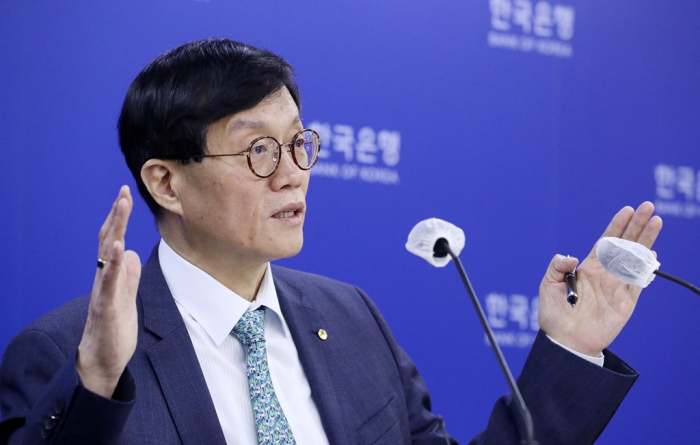Central bank
BOK chief defies rate cut calls amid sustained inflation
Governor Rhee says a cut will be discussed only when inflation is surely headed to 2% target; BOK, govt to focus on prices
By Mar 08, 2023 (Gmt+09:00)
2
Min read
Most Read
LG Chem to sell water filter business to Glenwood PE for $692 million


Kyobo Life poised to buy Japan’s SBI Group-owned savings bank


KT&G eyes overseas M&A after rejecting activist fund's offer


StockX in merger talks with Naver’s online reseller Kream


Mirae Asset to be named Korea Post’s core real estate fund operator



South Korean central bank chief on Tuesday defied calls for an interest rate cut this year despite growing risks of a recession in Asia’s fourth-largest economy as inflation has yet to slow enough to justify a monetary policy shift.
“It is premature to discuss a rate cut,” Bank of Korea Governor Rhee Chang-yong told reporters. “It is better to discuss a reduction only if consumer inflation falls to 3% by the end of this year and we become confident that it will head to the long-term target of 2%.”
“We will consider a cut only if inflation quickly eases after declining to 3% by year-end. Otherwise, we will raise (the rate).”
Consumer prices rose 4.8% in February from a year earlier, the slowest pace in 10 months.
The BOK held its policy interest rate unchanged at 3.50% last month based on expectations that inflation is likely to ease to below 4.5% in March, Rhee said.
“We predicted (inflation) to fall to low-3% around year-end, but it is necessary to check whether it will go that way.”
BOK, GOVERNMENT SHARE POLICY GOAL
The latest interest rate decision indicated the policy of both the central bank and government remained focused on inflation, Rhee said.
“I don’t think the policy directions of the government and BOK are different,” Rhee said. “The government and BOK both think it is necessary to continue to manage policy for stable prices as inflation remains around 5%.”
“We are still in a situation of hiking more or stopping here, so please interpret the latest policy decision as a judgment in consideration of financial stability with a priority on inflation.”
Rhee said the economy may rebound in the third quarter, adding prices of semiconductors and oil are key factors for near-term growth. South Korea is home to the world’s two largest memory chipmakers – Samsung Electronics Co. and SK Hynix Inc. – and semiconductors are the country’s top export item.
Last month, the BOK lowered its gross domestic product growth forecast for this year to 1.6% from its previous expectation of 1.7% published in November 2022. Its inflation forecast was also cut to 3.5% from the prior 3.6%.
RATE DIFFERENTIALS BETWEEN US AND S.KOREA
Rhee, meanwhile, said interest rate differentials between South Korea and the US are not the only factor for the weakness in the South Korean won currency and capital outflows.
“When the won depreciated to around 1,440 per dollar last September, the Korea-US rate differential was 0.75 percentage points. But when the won strengthened to around 1,220 in January, the gap widened to 1.25 percentage points.”
The Federal Reserve last month raised its benchmark interest rate by 25 basis points to a target range of 4.5-4.75% in its eighth hike since March 2022.
US central bank officials expressed a hawkish stance, given higher inflation and strong growth in the world’s top economy.
Fed Chairman Jerome Powell on Tuesday said that interest rates are likely to head higher than expected by central bank policymakers.
Write to Mi-Hyun Jo at mwise@hankyung.com
Jongwoo Cheon edited this article.
More to Read
-
 EconomyS.Korean inflation rises at slowest rate in 10 months in February
EconomyS.Korean inflation rises at slowest rate in 10 months in FebruaryMar 06, 2023 (Gmt+09:00)
2 Min read -
 Central bankBOK holds rates as it lowers growth, inflation forecasts
Central bankBOK holds rates as it lowers growth, inflation forecastsFeb 23, 2023 (Gmt+09:00)
2 Min read -
 Foreign exchangeS.Korean won near 2-month low as US data fans Fed hike views
Foreign exchangeS.Korean won near 2-month low as US data fans Fed hike viewsFeb 17, 2023 (Gmt+09:00)
2 Min read
Comment 0
LOG IN


